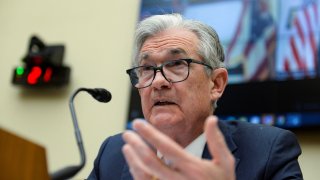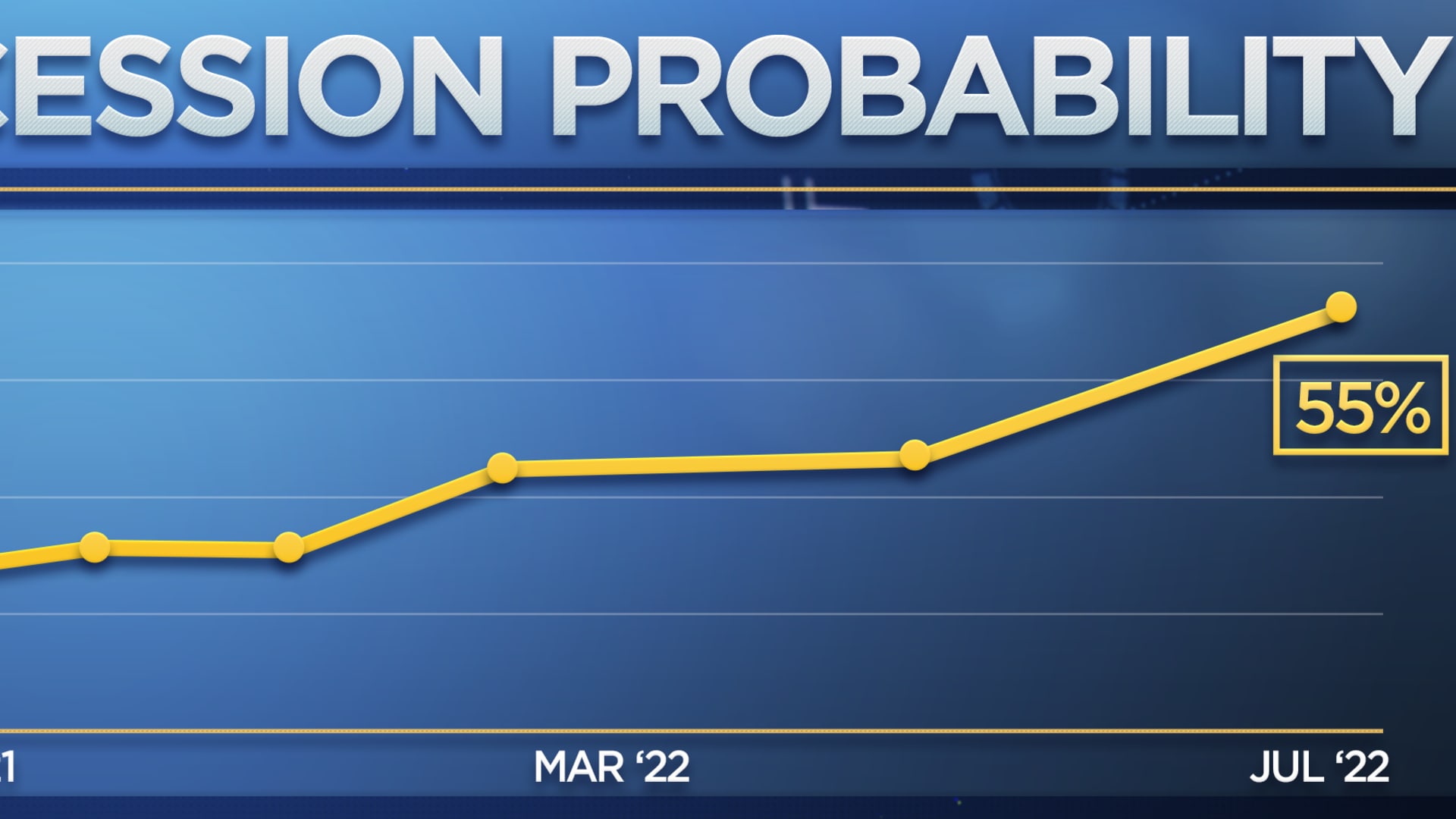
- According to CNBC's Fed survey, 63% believe the Fed's effort to bring down inflation to its 2% target would create a recession.
- They put a 55% chance on a recession in the next 12 months, up 20 points from the May survey.
- The survey respondents include fund managers, analysts and economists.
The Federal Reserve's efforts to cool inflation by hiking rates is most likely to lead to a recession, according to respondents of the CNBC Fed Survey. Though some continue to hold up hope of a soft-landing, the majority thinks the economy will begin to contract later this year.
Asked whether the Fed's effort to bring down inflation to its 2% target would create a recession, 63% said it would and just 22% said it would not. At the same time, the 30 respondents — who include fund managers, analysts and economists — put a 55% chance on a recession in the next 12 months, up 20 points from the May survey.
"A path to a soft landing certainly exists, but it's narrow, hidden, and very hard to find,'' wrote Roberto Perli, head of global policy research, Piper Sandler. "In fact, some indicators suggest the U.S. economy may either already be in recession or close to it."
Despite growing recession fears, the Fed is expected to hike and continue hiking until ultimately, sometime next year, it eases back interest rates. All but one respondent forecasts a 75-basis point interest rate hike (0.75 percentage point) at the meeting this week; the lone dissenter forecast a full percentage point move. The average forecast then sees the Fed funds rate hitting a peak of 3.8% in March 2023. It's then seen declining to 3.1% by year end 2023 and 2.9% by the end of 2024.
"I'd expect the Fed to start showing more consideration to the rising recession risks (and) start slowing the rate hikes from September," wrote Thomas Costerg, senior U.S. economist, Pictet Wealth Management. "I don't think the Fed will be able to continue hiking past December, as employment is likely to take a sharp turn lower, and that's likely to be a big red flag for them."
Money Report
A December recession
Of those who predict a recession in the next 12 months, most believe it will begin in December and most think it will be mild. At the same time, the average growth forecast has come down sharply. GDP forecasts have been slashed for every quarter this year and annually for this year and next. For example, respondents in January had forecast 2022 growth at a robust 4.7%. Over successive surveys that forecast has been slashed to stand at just 0.7% now. The unemployment rate is seen rising by 0.8 percentage point next year to 4.4%, while CPI surges to 6.75% before declining next year to 3.35%.

"After raising rates aggressively, the Fed may soon need to take a break and let the moves they have already made marinate," said Mark Vitner, managing director and senior economist, Wells Fargo Corporate Investment Bank. "A hiring frost is spreading from parts of tech sector to the broader economy and will soon turn into a hard freeze and, ultimately, rising unemployment."
One bright spot, respondents to the CNBC Fed Survey, who mostly always see the stock market as overvalued, now assess equities as the most reasonably priced since the onset of the pandemic.
Forty-eight percent says stock prices are low or about right relative to the outlook for earnings and economic growth, compared to 48% who say they are high. The two have not been that close since March 2020, when a majority believed equities were underpriced. As most respondents believe there is a high chance of recession, it suggests that most believe the stock market at this point has already priced in the downturn, at least a mild one.
While forecasts for the S&P have been brought down, they continue to show upside growth for this year and next. The S&P 500 is forecast, on average, to remain about flat this year, finishing at 3,989 but rise next year to 4,335. The benchmark closed Monday at 3,966.84.






